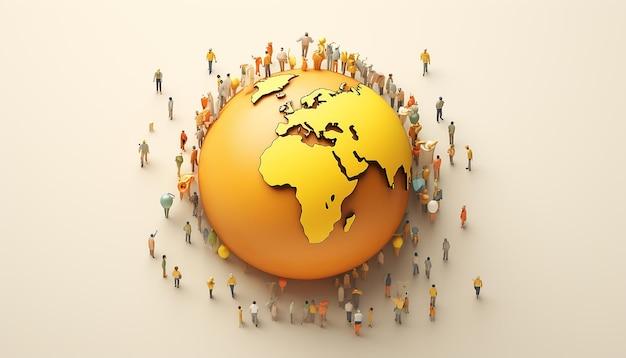Globalization, a term often heard but not always fully understood. It has become an integral part of our interconnected world, shaping economies, societies, and cultures. As we find ourselves in the year 2023, it is crucial to examine the impact of globalization in the Philippines. This archipelago nation in Southeast Asia has not been immune to the forces of globalization, experiencing both challenges and benefits alike.
In this blog post, we will explore the positive effects of globalization in the Philippines. We will delve into how globalization has transformed various aspects of Filipino society and economy, shedding light on its social and economic repercussions. Additionally, we will examine some of the challenges that arise with global business and discuss the hurdles faced in successful global trade. So, let’s dive in and discover how globalization has shaped the Philippines in uplifting ways!

What Are the Positive Effects of Globalization in the Philippines
Globalization has had a profound impact on the Philippines, bringing with it a range of positive effects that have transformed various aspects of the country. From economic growth to cultural exchange, the benefits are evident. Let’s explore some of the ways in which globalization has positively influenced the Philippines.
Boosting Economic Growth and Job Opportunities
Globalization has opened up new avenues for economic growth in the Philippines. Through increased trade and foreign investment, businesses have expanded, leading to the creation of more job opportunities for Filipinos. This has contributed to a reduction in unemployment rates and uplifted many individuals and families out of poverty.
Facilitating Enhanced Educational and Technological Exchanges
Thanks to globalization, the Philippines has seen remarkable advancements in its education and technology sectors. The exchange of knowledge, ideas, and expertise has become more accessible through collaborations with international institutions. This has not only improved the quality of education in the Philippines but also provided avenues for innovation and technological advancements in areas such as information technology, telecommunications, and healthcare.
Encouraging Cultural Exchange and Diversity
Globalization has brought people from different parts of the world closer together, fostering cultural exchange and diversity in the Philippines. This intermingling of cultures has enriched the country’s traditions, customs, arts, and gastronomy. Filipinos have gained exposure to various global perspectives, broadening their horizons and promoting a more inclusive society.
Spurring Tourism and Hospitality Industry
The Philippines’ natural beauty and unique cultural heritage have become more widely recognized and appreciated due to globalization. With increased connectivity and ease of travel, tourism has experienced a significant boost. Visitors from around the world flock to the Philippines to explore its stunning landscapes, pristine beaches, and vibrant cities, stimulating economic growth in the tourism and hospitality industry.
Strengthening Global Recognition and Influence
Globalization has provided the Philippines a platform to showcase its talents and achievements on the global stage. Filipino artists, musicians, athletes, and professionals have gained international recognition, boosting the country’s reputation worldwide. This has not only elevated national pride but has also presented the Philippines with greater influence in global decision-making arenas.
Promoting Accessible Information and Communication
Advancements in technology, brought about by globalization, have revolutionized information and communication in the Philippines. With the widespread availability of internet connectivity and improved telecommunications infrastructure, Filipinos now have easier access to a vast amount of information, enabling them to stay updated on global trends and developments. This has empowered individuals and communities to make more informed decisions and actively participate in a globalized world.
In conclusion, globalization has undeniably brought about a multitude of positive effects in the Philippines. From economic growth and job opportunities to enhanced educational exchanges and cultural diversity, the country has been able to harness the advantages of globalization to improve various aspects of its society. The Philippines stands poised to continue prospering on the global stage as it adapts and embraces the opportunities that come with an interconnected world.

FAQ: Positive Effects of Globalization in the Philippines
As we dive into the world of globalization, it’s important to understand the positive effects it has on different countries, including the Philippines. In this FAQ, we will explore some of the key questions surrounding the positive impacts of globalization in the Philippines. So, hold your seat tight, put on your reading glasses, and let’s get started!
What are four major hurdles to successful global trade
Global trade may seem like smooth sailing, but it’s not without its fair share of hurdles. Here are four major challenges that can hinder successful global trade:
1. Tariffs and Trade Barriers
Tariffs and trade barriers can put a serious dent in global trade. These measures, often imposed by governments, add taxes or restrictions on imported goods, making them more expensive and less enticing for consumers.
2. Cultural Differences
Navigating through the vast cultural differences across countries can be tricky. Different customs, languages, and traditions can create barriers to effective communication and understanding, posing challenges to international trade.
3. Logistics and Infrastructure
Getting goods from point A to point B is no easy task. Insufficient infrastructure, inefficient transportation systems, and logistical bottlenecks can cause delays, increase costs, and make global trade a real headache.
4. Legal and Regulatory Frameworks
Different countries have varying legal and regulatory frameworks, which can be confusing and time-consuming for businesses. Navigating through complex paperwork, licensing requirements, and compliance issues can be a challenge in the world of globalization.
What are the social impacts of globalization
Globalization has far-reaching social impacts, and the Philippines is no exception. Here are some of the key ways in which globalization has influenced society:
Economic Growth and Job Opportunities
Globalization has opened up new avenues for economic growth and job opportunities in the Philippines. It has attracted foreign investments, created new industries, and provided employment to countless individuals, thus improving their livelihoods.
Cultural Exchange and Diversity
With globalization, the world has become a melting pot of cultures and ideas. The Philippines has experienced an influx of foreign influences and cultural exchange, leading to greater diversity and the enrichment of local traditions and practices.
Access to Information and Education
Globalization has expanded access to information and education, thanks to technological advancements and the interconnectedness of the world. The Philippines has witnessed increased connectivity, which has empowered individuals to access knowledge and educational resources, bridging the gap between urban and rural areas.
Which societal factor is most affected by globalization
While globalization impacts various societal factors, the most affected one is undoubtedly the Philippines’ economy. The country has experienced significant changes in its economic landscape, thanks to globalization:
Increased Foreign Direct Investment (FDI)
Globalization has attracted foreign direct investment (FDI) to the Philippines. Foreign companies and investors have recognized the country’s potential, leading to the creation of jobs, the transfer of technology, and overall economic growth.
Market Expansion and Global Demand
Globalization has presented Philippine businesses with opportunities to expand their markets globally. Products and services from the country now reach far and wide, meeting the demands of consumers around the world and helping to strengthen the economy.
Employment and Entrepreneurship
As mentioned earlier, globalization has opened up job opportunities in the Philippines. It has not only created employment but has also fostered an entrepreneurial spirit. Filipinos are increasingly venturing into business, encouraged by globalization’s impact on trade and market accessibility.
What are the positive effects of globalization in the Philippines
Globalization has brought forth numerous positive effects upon the Philippines. Some key advantages include:
Economic Growth
Through increased trade and access to larger markets, the Philippines has witnessed substantial economic growth. Globalization has spurred investments, created jobs, and boosted the country’s GDP, contributing to a higher standard of living for many Filipinos.
Technological Advancement
Globalization has accelerated technological advancements in the Philippines. In today’s interconnected world, the country has embraced innovations and digitalization, leading to improved efficiencies, enhanced communication, and increased productivity across industries.
Cultural Exchange and Tourism
The cultural exchange prompted by globalization has made the Philippines a popular tourist destination. The country’s beautiful landscapes, diverse culture, and warm hospitality attract visitors from all corners of the globe. This influx of tourists contributes to the growth of the tourism industry and helps promote the rich Filipino heritage.
Knowledge and Skills Enhancement
Globalization has facilitated the exchange of knowledge and expertise. Through international collaboration and partnerships, the Philippines has benefited from access to new ideas, best practices, and advanced learning opportunities, fostering the growth of its workforce and contributing to human capital development.
What are the challenges of global business
Global business is not for the faint-hearted. It comes with its fair share of challenges. Here are some hurdles businesses face in the global marketplace:
Cultural Sensitivity and Adaptation
Different cultures have diverse expectations, values, and business practices. To succeed globally, businesses must adapt and be sensitive to cultural nuances, customs, and languages. Failure to do so can lead to misunderstandings, loss of trust, and potential business failures.
Competition and Market Saturation
Global business means facing intense competition. Entering new markets can be difficult due to existing competitors and market saturation. Businesses must differentiate themselves and offer unique value propositions to stand out in a crowded global marketplace.
Legal and Regulatory Compliance
Operating globally means being compliant with various legal and regulatory frameworks. Navigating complex international laws, trade agreements, and compliance requirements can be daunting and time-consuming, requiring businesses to stay informed and adapt to changing regulations.
Supply Chain Management
Managing global supply chains can be a logistical nightmare. From sourcing raw materials to coordinating manufacturing and distribution, businesses need efficient systems to ensure smooth operations. Challenges such as delays, customs clearance, and supplier reliability can disrupt supply chains and impact business performance.
And there you have it! We’ve journeyed through the positive effects of globalization in the Philippines, unraveling the impacts on society, economy, and beyond. While globalization presents its own set of challenges, the overall benefits it brings to the Philippines are undeniable. So, let’s embrace the interconnected world, explore new horizons, and make the most of the opportunities that globalization has to offer!
